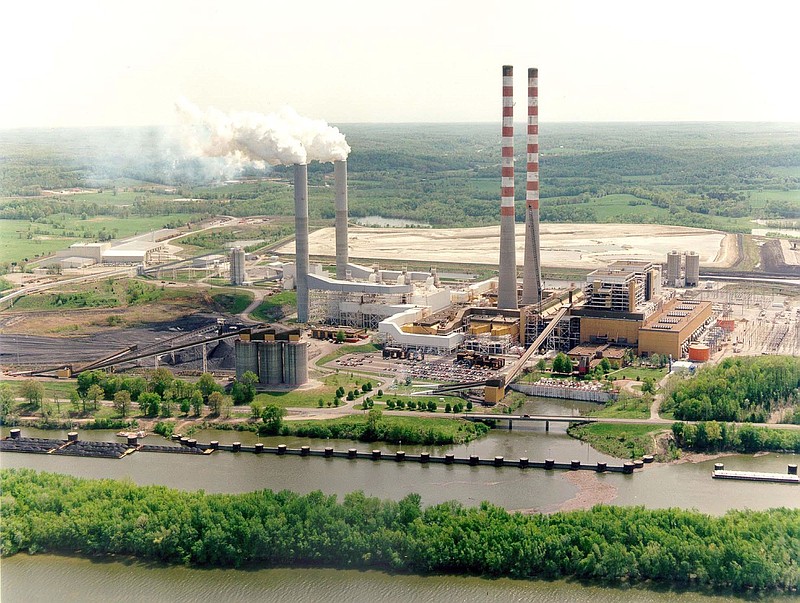The Tennessee Valley Authority is preparing to shut down its biggest coal power plant within the next six years as America's biggest public power company phases out what was once its primary source of power.
A final environmental assessment recommends the Cumberland Fossil plant be shut down by 2028 because the 54-year-old plant northwest of Nashville is not efficient or clean enough to meet TVA's clean air goals.
But TVA is not giving up on fossil fuels altogether. If TVA President Jeff Lyash accepts the recommended path for the Cumberland site as expected next year, the federal utility will begin next summer to build a natural gas combined cycle plant to replace much of the 2,470 megawatts of generating capacity of the two existing coal-fired units at Cumberland.
The 1,662-page report released by TVA on Friday echoes a preliminary finding released in August that concluded TVA should shut down one of its aging coal units at Cumberland by 2026 and the other by 2028 and turn to more efficient and cleaner natural gas generation. TVA is also studying a similar move at its Kingston Fossil Plant in East Tennessee.
"Natural gas provides the flexibility needed to reliably integrate renewables," Jacinda Woodward, senior vice president of TVA power operations, said in a statement Friday.
But environmental groups pushing TVA to move to carbon-free energy as soon as possible blasted the idea of spending potentially billions of dollars to build new natural gas plants at TVA's shuttered coal facilities.
(READ MORE: Environmentalists fight TVA's long-term contracts)
"This makes neither environmental nor economic sense, and we are absolutely disturbed to see TVA rushing this in before a new TVA board gets a chance to review this decision, which will lock in fossil fuels for the next 40 years," Stephen Smith, executive vice president for the Southern Alliance for Clean Energy, said in a telephone interview Friday, "We'd like to see any decision about building new gas plants at Cumberland, as well as at the Kingston plant, to be held until the new directors have a chance to review this decision."
Pending Senate confirmation of President Joe Biden's appointees, TVA could get six new directors on its board in January to join the three that are remaining after the end of this year. Smith said he hopes the Biden appointees will do more than the current board, which were appointed by former President Donald Trump. Smith said the board "rubber stamped" the gas plant plans and delegated the decision making over the new generation to Lyash.
Smith said solar power is cheaper and cleaner and TVA can use its hydroelectric dams and pumped storage facilities, along with new battery storage capabilities, to meet peak demand periods.
In a statement Friday, Lyash said the environmental review of the options for the Cumberland Fossil Plant during the past year was a "transparent process" and "is one of the ways that TVA is working to build a clean energy future which will enable ongoing and future growth across the region." The study examined solar, battery storage, energy efficiency and coal options for the Cumberland site and concluded that a natural gas combined cycle plant would offer the most reliable, low-cost power while reducing TVA's carbon footprint.
(READ MORE: Senate panel narrowly votes in favor of Al Gore's former chief of staff for TVA board)
Woodward said battery storage technology "doesn't currently provide the output duration needed to support system needs" when the sun doesn't shine or the wind doesn't blow.
"Natural gas is needed to produce power during early morning winter peaks or during overcast or rainy days," Woodward said.
But Gaby Sarri-Tobar with the Center for Biological Diversity, called TVA's plan to build new natural gas generation "reckless." TVA already generates more than 20% of its electricity from burning natural gas, which is subject to volatile gas prices as the past year has demonstrated. Although combined cycle gas plants emit less carbon than coal-fired plants, they are not carbon free and won't meet Biden's goal of achieving a carbon-free power sector by 2035.
"This is a slap in the face to the 10 million customers who rely on TVA and makes a mockery of the Biden administration's clean energy pledges," Sarri-Tobar said in a statement.
TVA has set a goal to reduce greenhouse gas emissions by 70% by 2030 and by 80% by 2035, compared with 2005 levels. Lyash said TVA has "an aspirational goal" of being carbon free by 2050 even as he predicts electricity demand in TVA's seven-state region will be up 50% to 100% over the next three decades.
Scientists have warned that failing to meet Biden's 2035 target could lead to more intense and frequent extreme weather events, as well as droughts, floods and wildfires.
The planned shutdown of the Cumberland Plant and a similar study underway on the closing of the Kingston Fossil Plant follows TVA's earlier closings in the past decade of its John Sevier, Widows Creek, Colbert, Allen and Paradise coal plants. TVA has or is building new gas plants at the shuttered Allen, Paradise, Colbert and John Sevier plants.
Contact Dave Flessner at dflessner@timesfreepress.com or 423-757-6340. Follow him on Twitter @DFlessner1.
